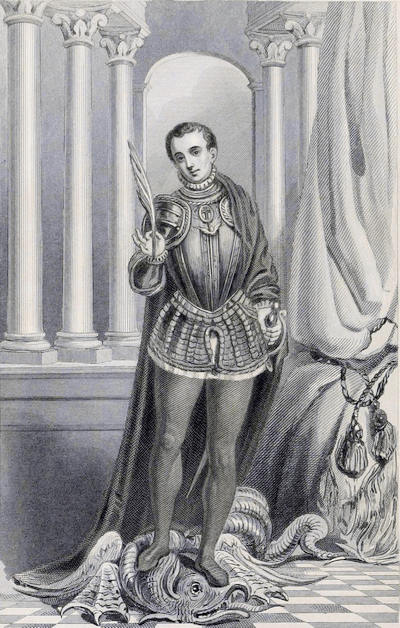TRANSCRIBER’S NOTES:
—Obvious print and punctuation errors were corrected.
—The transcriber of this project created the book coverimage using the front cover of the original book. The imageis placed in the public domain.
THE CONSPIRACY
OF
GIANLUIGI FIESCHI.

Painted by Luca Combiaso—————————Engraved by H. Adlard.
PORTRAIT OF FIESCHI AS S.T GEORGE.
SEE PAGE 195.
SAMPSON LOW, SON & MARSTON, MILTON HOUSE, LUDGATE HILL, 1867
THE CONSPIRACYOFGIANLUIGI FIESCHI,
OR,
GENOA IN THE SIXTEENTH CENTURY.
BY
EMANUELE CELESIA.
TRANSLATED FROM THE ITALIAN,
BY
DAVID H. WHEELER.
LONDON:
SAMPSON LOW, SON & MARSTON,
MILTON HOUSE, 59, LUDGATE HILL.
1866.
[The Right of Translation is Reserved.]
PREFACE.
It is perhaps matter for just surprise that Englishliterature has been so little enriched during the lastquarter of a century by archivic researches in Italy.While these studies have greatly modified the viewsof Italian historians, it may be safely said that, withfew exceptions, English history of Italy remains substantiallyas it was in 1840. The conspiracy ofGianluigi Fieschi, now presented to the English readingpublic, is one of those works which strongly mark theprogress of historical research in the Italian Peninsula;and though it treats of an episode, that episode is sowoven into the great events which surrounded it as togive a vivid picture of the condition of Italy in thesixteenth century. The work has therefore seemed tome to have sufficient historical value to merit translationinto our language.
I have been more influenced, however, by a desire tomake some of those who read only English acquaintedwith an Italian author who seems to me entitled to alarger public than his own people. There is no goodreason why a greater number of Italian writers shouldnot be favoured with an English dress; and it isprobably more the effect of accident than want ofmerit in Italian writers that their works are muchmore rare in our tongue than those of French andGerman authors. The younger historical writers ofthe time, to which class M. Celesia belongs, havepeculiar claims upon our attention, because they are thefirst truly independent writers of the Peninsula, andtheir works are the first fruits of liberal institutions anda Free Press. It would be only a first homage to theirworth and sincere devotion to liberal principles to